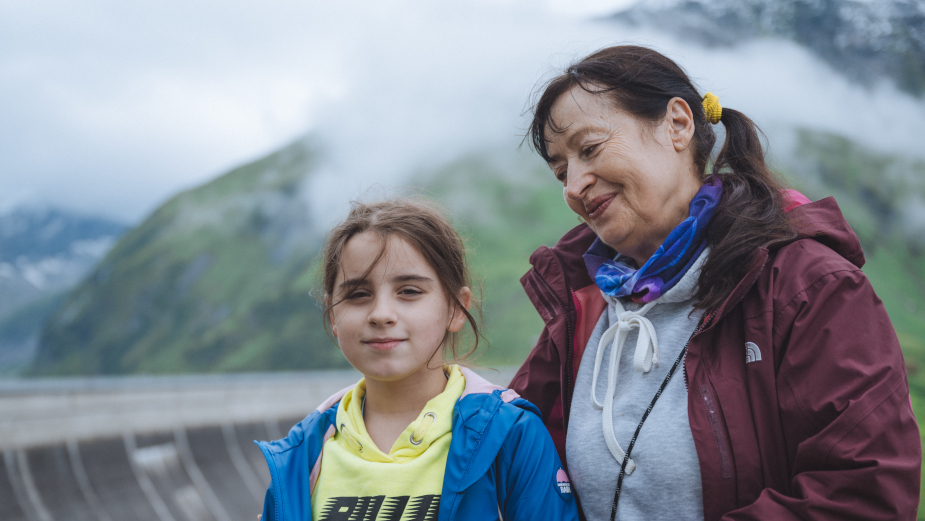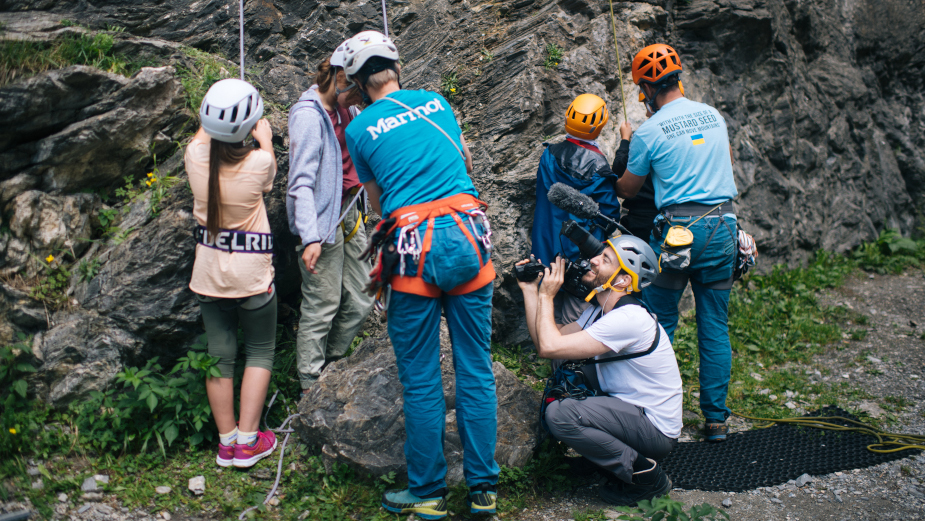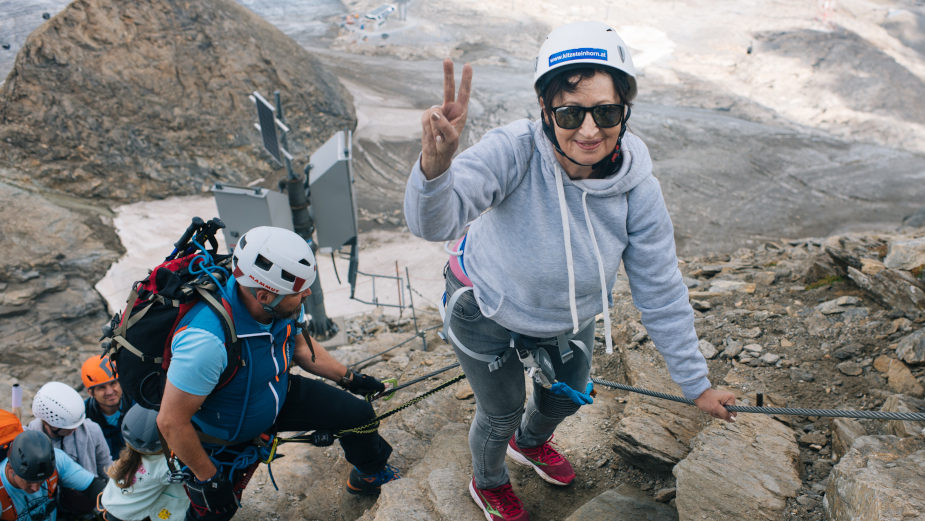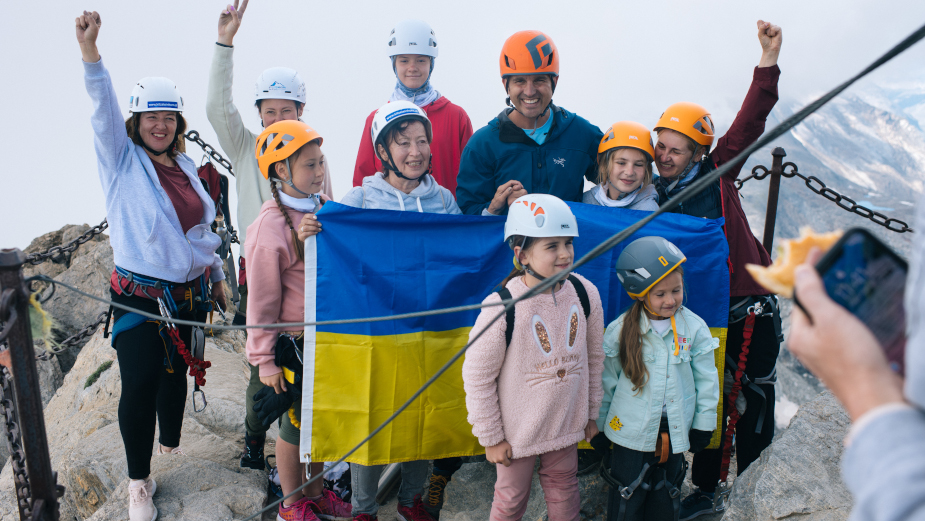
LBB Film Club: Camp Courage

Mountain Seed Foundation is an organisation that sprouted in the wake of the Russian invasion of Ukraine - it began as a group of people, mainly US foreign service members who had previously worked in Ukraine, and their colleagues and friends, who set up a camp.
Using an “evidence-based, family-focused approach” founded on psychoeducational modules and nature-based activities, the camp helps its participants - Ukrainian families affected by the trauma of war - find their way back to their strength, courage and resilience, as well as forge a sense of community at a time when they are most prone to tear apart. The foundation of this is rooted in hiking and nature-based activities.
In comes Max Lowe - Fresh Film’s director most notably known for his widely successful documentary film ‘Torn’, on National Geographic. In the documentary, Max tells his personal story of being emotionally affected by his father - Alex Lowe’s - tragic death, alongside his cameraman and fellow climber David Bridges, in 1999, during an avalanche on the slopes of Shishapangma, in China.
So, when the opportunity to work with Mountain Seed came, Max couldn’t say no. He embarked on a journey of following 11-year-old Milana, who he admits reminded him of himself after his own traumatic experience of losing family, and her grandmother Olga. Max and his crew followed Olga and Milana throughout their journey to the Austrian mountains, and the week they spent in the camp.
‘Camp Courage’ digs deep into the delicate truth that war, wherever in the world, sends shock waves of trauma across generations to come, and projects like Mountain Seed are the culprit behind helping those who have seen their homes and families torn apart by war. LBB’s Zoe Antonov and Max speak about the film below.

LBB>Tell me about the film’s conception - how did the idea come about and how long was it in the making?
Max> The concept for this film came on about as naturally as you could possibly come to a story. Mountain Seed Foundation, the organisation that puts on the camp, had reached out to me to see if I would come to share the feature documentary I had directed about my own family - ‘Torn’ - and share with the families how I had processed past trauma in my family through storytelling.
When they told me about what they were doing at the camp, in hopes of helping families impacted by the war in Ukraine with their own trauma, the fit simply snapped into place in my mind. This was how I could take what I had just learned in ‘Torn’ and apply it to help other families, the world across, examine their own grieving process. Mountain Seed introduced me to Milana and Olga, who planned to attend the camp, and when they agreed to tell their story the film was off.
LBB> What informed your ideation process? How long did it take to start working on the documentary?
Max> The ideation process was fast. From my initial contact with Mountain Seed Foundation meeting Milana and Olga, and then bringing the project to Big Mouth productions, it was about five weeks until we were funded for the development of the project. We then headed to Slovakia to meet Milana and Olga and travel with them to the camp in Austria. It was a fairly straightforward process of just working with the grandaughter and grandmother to feel out the story of their lives as they were willing to share it, and then just following them in almost strictly verite fashion through the week at camp.
LBB> Tell us more about Mountain Seed - how did you connect with them and why did they decide to take part in the film?
Max> The organisation Mountain Seed Foundation was just launched last year in the wake of the Russian invasion, and the year we were there filming was its first year operating the camp. Founded by a handful of US foreign service members who had all worked in Ukraine before the war, along with their Ukrainian friends and counterparts, the camp was intended to be a way for them to help a few Ukrainian families as a service to the country that had given them so much when they were stationed there. As I saw before, they initially reached out to me to screen Torn and that was what kick-started this whole project.

LBB> There are millions of touching and heartbreaking war stories out there - but you chose to tell this one. Why?
Max> I went into this project not really wanting to tell a war story per se, but more a story about people moving on from trauma adjacent to the war in Ukraine. The story of the war itself was being covered by so many, and as it should have been largely by Ukrainian storytellers, this story felt a step apart from this specific war.
Of course, it is tied to this point in time by the war in Ukraine, but as Nathan - the founder of the camo states in the film - said, the work they are doing at Mountain Seed isn't rooted in any one war. The war is irrelevant, it's about moving on from the trauma of war in general and through community and mutual support finding and sharing those pathways with others who seek them.
LBB> Why was documentary the best medium for this topic?
Max> This project was perfect for a vérité documentary in form because Milana and Olga were about to embark on this week-long experience where they would both in theory be challenged to change in some capacity. They had both already been the focus of some media attention at the time of Milana's mother’s death as well so there was a healthy archive that existed as well to help tell the story of their past trauma in a way that a broader audience could empathise with and understand.
LBB> Where does the name come from?
Max> We workshopped a few different names over the course of the film, but ‘Camp Courage’, although a little tacky, really embodied what the experience with Mountain Seed was all about, not only finding the courage to climb mountains and face your immediate fears, but also the deep fears we all harbour in facing the darkness that surrounds us, especially painful and difficult experiences in life that we struggle most to make sense of.
LBB> How did you connect with your main subjects on a deeper level?
Max> The facilitators of Mountain Seed Foundation initially connected me with Olga and Milana because of the history they had already had in sharing their stories. I personally connected with them though, because I saw in Milana my own young self having just lost my father and being at a loss for what comes next. When we first met them as well, our crew was so perfectly attuned to be present and just following them naturally through their day to day, that they very quickly opened up and let us in on very intimate moments. My associate producer and assistant director Julia Pavliuk, who is Ukrainian and spoke Russian and Ukrainian as a translator during production also played a huge part in that, making Milana and Olga confident that we were there to support them and tell this story with them.
LBB> What was it like working with children on such a difficult topic?
Max> It was tough, to be honest. Going into our production in Europe I was a bit terrified to be stepping into a project where I knew this little girl who had experienced unimaginable pain in her life was going to be a subject. I was scared because I too had been her age when my father died, and the story of his death was spun into a frenzy of dramatised breaking news and opinionated malarky and that scarred me as a kid.
But, I think that understanding is honestly what allowed me to work with Milana in the way we did, that from my perspective allowed her to tell her own story in a way that wasn't overbearing or dramatised. I intentionally never pushed her to talk about any of the trauma she had experienced directly and we instead just followed her through this week at camp giving her the space to explore the lasting effects of that trauma in more subtle ways.

LBB> How did you manage to keep the authenticity intact?
Max> We were there at the camp throughout the entire experience and participated in the camp alongside everyone else when we weren't filming with Olga and Milana. I don't believe in separating myself from my character's journeys, and I think this was a prime example of that being effective not only for the films purposes, but also for the feelings we all walked away from the experience with, a sense of community and trust.
LBB> As a documentary maker you need to connect with your subjects on a deep level to gain trust - how did you manage that? Did you guys become friends by the end?
Max> Yes I think we managed that, and although it's not easy becoming friends with an 11-year-old of any ilk, Olga and Milana both became quite fond of all of us on the crew very quickly, and us of them. I actually went back to the camp this summer with my fiance to volunteer, and Milana and Olga got to come back. It was so special to experience the week with them again and see how they had both grown in confidence, courage and grace.
LBB> What were the most challenging parts of creating the documentary? Why?
Max> Definitely navigating the trauma that Olga and Milana and all the members of the camp had shared with a delicate and empathetic hand was the most difficult part. We had to tell that part of the story, but to ask someone to face that sort of darkness with you is no small thing, and we made sure to really tread lightly on making sure not to push either Olga or Milana to explore anything with us that they weren't ready to.
LBB> And what about the most fun parts?
Max> The most fun part was certainly the last day when Milana summoned the courage to climb the big peak with all the other kids, not only because we got to see the payoff and pride in her so clearly, but also because it made for such a perfect ending to the whole experience and story.
LBB> How long did the creation process take and what are some lessons you will take from this project for the rest of your career?
Max> From start to finish the creation process was just a little over a year which, for a project of this scale, was remarkable. I think I honestly put all credit to my team and the beautiful synergy we found in all putting in the effort equally to get each process of the production. So much of a successful production rests on having a solid team that not only shows up, but is responsive, transparent and willing to put 100% of themselves into the work and every person who worked on Camp Courage hit the mark in that department from my producers, to our amazing production team, to my editor Andrey Alistrov and our post team. I hope I can keep finding working relationships going forward like I did in the process of making this film.
LBB> What do you hope that audiences take away from the film most?
Max> I hope that audiences of ‘Camp Courage’ will take away two things. Firstly, being an acknowledgement of how mass traumatic events especially wars create waves of PTSD that echo out into ensuing generations far beyond the initial atrocities and if we ever hope to see an end to war we must learn to treat those who have experienced these traumas with kindness, grace, humility and unwavering support whether that veterans or civilians.
Secondly, I hope that similarly to ‘Torn’, audiences take away the inspiration and understanding that anyone facing the trauma of loss still has a second chance waiting for them to face that and change the course of their own lives. By acknowledging and facing that trauma, only then do we have the power to affect how it impacts our lives.
‘Camp Courage’ is currently available to stream globally on Netflix.













